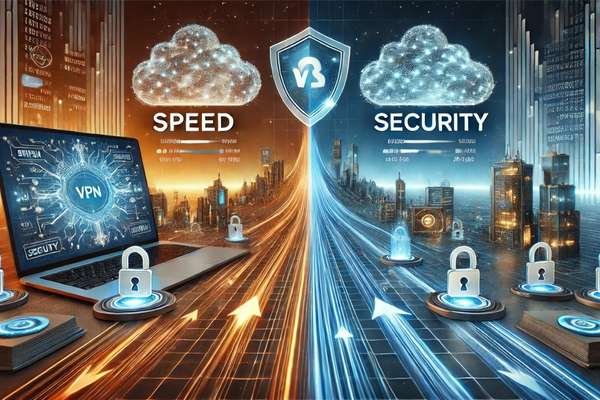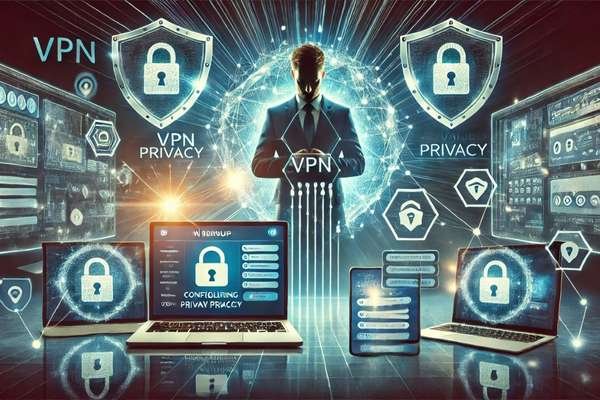
How to Configure Your VPN for Maximum Privacy
November 13, 2024
Top VPNs for Android Devices in 2025
November 13, 2024Speed vs Security Choosing the Best VPN Protocol: Balancing speed and security in a VPN protocol choice is crucial for digital professionals today. Whether you’re a digital marketer seeking swift connections to access global content or a developer handling sensitive data, the VPN protocol you choose can significantly impact your productivity and security. Each protocol offers a unique combination of speed, encryption, and stability, and understanding these differences helps you make an informed choice tailored to your specific needs. In this article, we’ll explore the leading VPN protocols and examine which options offer the best blend of performance and protection for professionals in fast-paced digital fields.
Table of Contents
1. Why VPN Protocols Matter for Digital Professionals
What is a VPN Protocol?
A VPN protocol is the set of rules that determine how data is transmitted and secured over a Virtual Private Network (VPN). Each protocol offers unique features in terms of encryption strength, connection speed, and data security. The primary function of a VPN is to provide a secure and private connection over the internet, but not all protocols are equal.
Importance of VPN Protocols for Speed and Security
Digital marketing professionals, developers, and content creators often need fast and reliable internet connections. They may also be handling sensitive client data or accessing geo-restricted content, where both speed and security are vital. The right VPN protocol can help balance these requirements.
Key Points
- Speed: For activities like content uploads, video streaming, and large data transfers.
- Security: To protect client data, intellectual property, and maintain compliance.
2. Overview of Popular VPN Protocols
2.1 OpenVPN
OpenVPN is known for its balance between speed and security. It is an open-source protocol that uses SSL/TLS for secure key exchange, providing strong encryption without compromising performance.
Advantages
- High compatibility across devices and operating systems.
- Robust encryption standards (up to 256-bit).
- Widely used and supported, offering reliability.
Disadvantages
- Requires manual configuration for optimized performance.
- Somewhat slower than newer protocols like WireGuard.
2.2 WireGuard
As a modern VPN protocol, WireGuard is celebrated for its simplicity and speed. It uses fewer lines of code, which makes it faster to execute and easier to audit for vulnerabilities.
Advantages
- Minimal code, improving speed and security.
- Faster connection and reconnection times, ideal for mobile users.
- Increasing support across VPN providers.
Disadvantages
- Still relatively new, so it lacks support on some devices.
- Limited feature set compared to more established protocols.
2.3 IKEv2/IPsec
IKEv2/IPsec is particularly popular among mobile users due to its resilience in maintaining connections when switching networks, such as from Wi-Fi to mobile data.
Advantages
- Stable and fast on mobile devices.
- Strong encryption, often used in corporate environments.
- Good for bypassing geo-restrictions.
Disadvantages
- Slightly slower than WireGuard.
- Requires complex setup if not pre-configured by the VPN provider.
2.4 PPTP
The PPTP protocol is one of the oldest VPN protocols and was primarily used for dial-up connections. It offers basic encryption and is generally fast but not secure by modern standards.
Advantages
- Fast connection speeds due to minimal encryption.
- High compatibility with older devices.
Disadvantages
- Weak encryption, easily compromised.
- Not recommended for securing sensitive data.
3. Speed vs. Security: An In-Depth Analysis
Understanding the Trade-offs
When choosing a VPN protocol, understanding the trade-off between speed and security is essential. Professionals needing quick access may prefer a protocol with minimal encryption, while those handling sensitive information might prioritize security.
Factors Affecting VPN Speed
- Encryption Level: Higher encryption levels generally slow down speeds.
- Network Latency: The distance between your location and the VPN server.
- Data Compression: Some protocols offer data compression, improving speed.
Factors Affecting VPN Security
- Encryption Strength: Protocols like OpenVPN and IKEv2 use robust encryption algorithms, whereas PPTP’s encryption can be bypassed.
- Authentication Methods: VPNs that use TLS for authentication are generally more secure.
- Audited Codebase: Open-source protocols allow for public security audits, which increases trust.
4. Use Cases and Recommendations
Choosing the Right Protocol Based on Your Needs
For digital professionals, the choice of VPN protocol will depend on specific needs, such as streaming, secure file transfers, or remote work.
4.1 For Content Creators
Content creators often upload large files, such as videos and images, requiring both speed and moderate security.
Recommended Protocol: WireGuard
WireGuard offers fast connections ideal for uploading and downloading content, even from remote servers. Its streamlined encryption ensures data integrity without a significant speed trade-off.
4.2 For Digital Marketers and Advertisers
Digital marketers often use VPNs to access geo-restricted platforms or analyze competitor strategies. The speed of loading pages quickly and switching between regions is essential.
Recommended Protocol: OpenVPN (UDP)
Using OpenVPN with UDP ensures faster connections and reasonable security, perfect for geo-spoofing and accessing restricted content.
4.3 For Developers Working Remotely
Developers often need secure connections to access servers and collaborate on projects. Data integrity is crucial, especially when handling sensitive code or client information.
Recommended Protocol: IKEv2/IPsec
IKEv2 is highly secure and stable, ideal for remote work. It maintains stable connections on mobile devices, which is beneficial if developers are working on the go.
Speed vs Security Choosing the Best VPN Protocol Comparaison
VPN Protocols: Balancing Speed and Security
Explore the top VPN protocols and their unique features to find the perfect balance of speed and security for your digital needs.
| Protocol | Key Features | Best For | More Info |
|---|---|---|---|
| OpenVPN |
– Robust encryption (AES-256) – Open-source with frequent updates – Reliable and widely supported | Balanced speed and security; ideal for general use. | Learn More |
| WireGuard |
– Minimal code for fast execution – High-speed connections – Easy to configure and audit | Fast connections; perfect for content creators and streamers. | Learn More |
| IKEv2/IPsec |
– Strong encryption for secure connections – Stable on mobile devices – Resilient to network changes | Mobile users and remote developers needing security. | Learn More |
| PPTP |
– Fast connection speeds – High compatibility with older devices – Easy setup | Basic tasks with minimal security requirements. | Learn More |
5. Frequently Asked Questions
What is the best VPN protocol for speed?
WireGuard is currently considered the best VPN protocol for speed. Its streamlined code base allows it to connect and reconnect quickly, with low latency, making it ideal for content creators and digital marketers.
Which VPN protocol is the most secure?
OpenVPN is widely regarded as the most secure protocol due to its robust encryption standards, adaptability, and frequent updates from the open-source community.
How do I know which VPN protocol to use?
The choice depends on your needs. If you prioritize speed, WireGuard is ideal. For those who need balanced speed and security, OpenVPN is recommended. For mobile stability, IKEv2 is best suited.
Conclusion
Choosing the right VPN protocol is essential for digital marketing professionals, developers, and content creators who need both speed and security. By understanding the strengths and limitations of each protocol—OpenVPN, WireGuard, IKEv2/IPsec, and PPTP—you can select the best option tailored to your needs. Whether prioritizing speed for content uploads or security for handling sensitive data, there’s a protocol that aligns with your goals.








